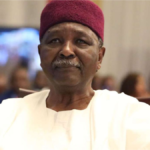I borrowed the title of this column from the late American novelist and polemicist, Norman Mailer, once regarded as the enfant terrible of American literature. In 1959, he published a 576-page book with the above title described by the publisher as “a comprehensive collection of the best of his essays, stories, interviews and journalism from the forties and fifties, linked by anarchic and riotous autobiographical commentary.”
This piece does not pretend to rise to that lofty height. It is simply the story of my books and not necessarily an advertisement for myself. But it cuts both ways, to be honest. The queries came from people who read my reminiscences published in the Daily Trust on Sunday of June 13, 2021. One man wrote: “I can see that journalism has been kind to you. I wonder what you would be leaving behind for younger men and women who, inspired by you, are following your footsteps. Have you written any books to offer them a road map, especially for those who may not have the kind of mentors you had in your early years in the profession?”
It touched me. This piece then, as my attempt to respond to that question. To begin with, I have had the privilege of editing three national newspapers, namely, The Nigeria Standard, Jos, the New Nigerian, Kaduna, and Newswatch magazine, Lagos. I went through them and they went through me and thus enriched me in a way nothing else would professionally. I am grateful to the young men and women who worked with me in all these publications. In mentoring them, I also continued to mentor myself, learning new ways of doing the old things in the profession and, more importantly, honing my writing skills that eventually propelled me to try my hands at writing books.
So far, I have written eight books and edited four; not all of them are on the dos and don’ts of journalism but are nevertheless related to the profession. My first book was a corporate assignment from my colleagues in Newswatch magazine. Sometime in 1995, they tasked me with writing the house style for the magazine. All great newspapers and magazines have their individual house styles that in a major or minor way sets each part from other publications. The house style is a set of rules of writing peculiar to each publication. It may be something as simple as: once you refer to a man as Mr or Chief Richman, in subsequent references you drop the title and use his name, Richman; to something as complicated as the sparing use of adjectives so as not to say less than what you mean.
The result of my effort was published in 1996 with the obvious title of Style, The Newswatch Style Book. It was meant essentially for the editors and the reporters of the magazine but it somehow found its way into a number of polytechnics where the students lapped it up. This encouraged me much later to expand the book and published it under a new title: Style: A Guide to Good Writing, published in 2010. Again, the reception was very good. Taken together, they were my initial primer on journalism written entirely from a local perspective.
I ventured further afield. In 2008, I published The Reporter’s Companion. I wanted a book that would serve as a pocket companion for reporters, old and aspiring. I was pleasantly surprised to see it adopted as a textbook by some of our universities and polytechnics. It was reprinted three times to satisfy demands. It is still in great demand.
Flattery would get you anywhere. So, so flattered by the favourable reception of that book, I ventured much further. In 2012, I published The Columnist’s Companion: The Art and Craft of Column Writing, which I dedicated to my ever green mentor, the late Malam Adamu Ciroma. It has been reprinted four times. Column writing has become a very popular genre of journalism. Everyone, journalists and non-journalists alike, wants to be a columnist. As I contemplated writing the book, I decided to research it to see what was available. I was shocked to see that there were virtually no books on this popular form of journalism. The British have nothing on it. The Americans had a couple of books or so. I felt challenged to undertake it. As you can see, I am a brave man. The result was a 305-page book which became and remains popular among all those who aspire to write for newspapers. I confess it is my favourite book too.
I recalled in my reminiscences Mallam Adamu’s unique mentoring system. Early in my career, when I did not even know what the rope was, let alone learn it, he assigned me to interview the six military governors of the then six northern states. An intimidating assignment for a green horn in the profession. He wanted me to learn the rope by doing, not by theory. I carried out the assignment. From it, I knew what the rope was and gradually learnt it.
I thought I should share my experience with younger reporters. In 2018, I published a book on it titled: The Six Military Governors: Voice of History; Reminiscences of a Reporter. My good friend and fellow labourer in the vineyard of column writing, Dr Haroun Al-Rashid Adamu, wrote an enlightening preface to it. In it, I told of the challenges I faced and how I navigated them. My hope is that younger reporters faced with similar challenges could learn from my experience. I reproduced the interview with each military governor in the book so we can still hear their voices as they grappled with their military assignment. They were relatively young men, inexperienced in administration but tasked with setting up new state administrations to give meaning to General Yakubu Gowon’s political wisdom of balkanising the four regions into twelve states. These men are no longer with us but they played their part in saving our country when it faced its critical existential challenges with the secession of the former Eastern Region and the civil war. Their voices must be heard from the past and they remain the voices of our national history.
In addition to these books dealing directly with journalism, I have also written books on other aspects of our national life with peripheral nod to journalism. In the year 2000, I made an attempt at our national history with the publication of my book, Fellow Nigerians: Turning Points in the Political History of Nigeria. I took the first part of the title from the salutation that followed the martial music each time an ambitious officer in the Nigerian Army offered himself to us as the messiah we had been expecting. I dated it to January 15, 1966, Nzeogwu’s bloody coup, signalling the day the country began its political dance on the tip of a needle.
The book contains all coup speeches, successful or abortive, since that first coup. It also contains speeches by three civilians who stepped into the shoes of the generals – President Shehu Shagari and Chief Ernest Shonekan and ends with that of the civilianised President Olusegun Obasanjo in 1999. Each chapter begins with the coup speech followed by the inaugural broadcast by the man of the moment. Using the claims of the generals, I then analysed the prevailing social, economic and political conditions against that background. My objective was to put the claims in perspective and leave my readers to judge if the circumstances warranted the change of government.
My most popular book so far outside my books on journalism is: Nigeria their Nigeria, published in 2008 to rave reviews. The book has been reprinted seven times. It is out of print. I don’t even have my own copy. Don’t laugh. Oscar Onojighofia described it in The South South International magazine as “…one of the finest books ever written about the nation’s history and its people…”
I ploughed on, giving something back to journalism. Perhaps, my most ambitious book was the biography of President Ibrahim Babangida. As I said earlier, I am a brave man and so I bravely ignored myself as a rookie biographer and took on this self-imposed task on telling the story of this great man who left large footprints on the sands of our nation. The book, Ibrahim Babangida: The Military, Politics and Power in Nigeria, was published in 2012 also to rave reviews. It was about Babangida and it was about the involvement of the military in our national politics. The Daily Trust on Sunday serialised it for 30 weeks. It was translated into a Braille edition, the first of its kind in the country. It is also widely available in virtually all our institutions of higher learning.
Its success led to my writing the biography of another military man, Vice-Admiral Murtala Nyako, the pioneer military governor of Niger State, former Chief of Naval Staff, former deputy chief of defence staff, and former governor Adamawa State. The book, Footprints on Marble, was published late last year. It is my latest book. It sheds some light on military politics and exposes its underbelly.
The four books I have edited are: Newswatch Conversation with IBB, The Energy Crisis in Nigeria (2009), In the Service of My Country: Selected Speeches of Dr Abdullahi Adamu (2010) and Conversation with History (2015) being selections from the Newswatch Summit.
There you have it: advertisement for myself from a reluctant self-advertiser.

 Join Daily Trust WhatsApp Community For Quick Access To News and Happenings Around You.
Join Daily Trust WhatsApp Community For Quick Access To News and Happenings Around You.

